-
REVIEW05-03-2024
Elements of fatherhood involved in the gestational period: a scoping review
Revista Brasileira de Enfermagem. 2024;77(1):e20230029
Abstract
REVIEWElements of fatherhood involved in the gestational period: a scoping review
Revista Brasileira de Enfermagem. 2024;77(1):e20230029
DOI 10.1590/0034-7167-2023-0029
Views0See moreABSTRACT
Objective:
To identify in the literature and summarize the elements and characteristics of fatherhood involved during pregnancy.
Method:
Scoping review that used PRISMA-ScR guide to report this review. Searches were carried out in PubMed, CINAHL, PsycInfo, LILACS and Scopus. Google search engines and public health agency websites assisted in searches of gray literature and Rayyan in screening studies.
Results:
A total of 406 articles were identified, of which 16 made up the final sample. Five elements make up an involved fatherhood: feeling like a father, being a provider and protector, being a partner and participant in pregnancy, participating in prenatal appointments and feeling prepared to take care of a baby.
Conclusion:
Fathers want to be involved in prenatal care, but feel excluded from this process. Public policies that encourage paternal involvement and healthcare professional training to better welcome and promote paternal involvement are of paramount importance.
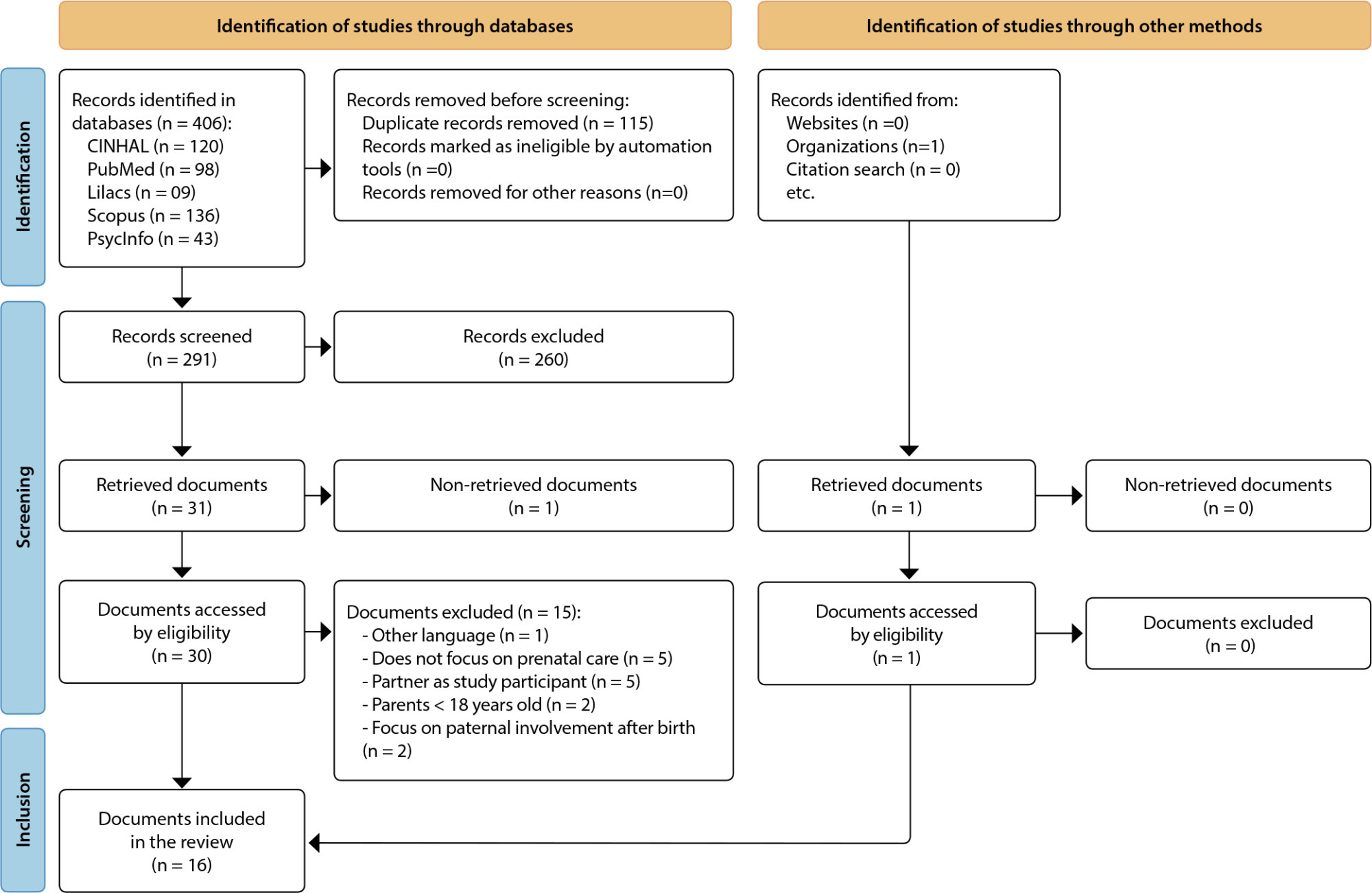
-
ORIGINAL ARTICLE05-03-2024
Josicélia Dumêt Fernandes’ professional trajectory: contributions to psychiatric and mental health nursing
Revista Brasileira de Enfermagem. 2024;77(1):e20230174
Abstract
ORIGINAL ARTICLEJosicélia Dumêt Fernandes’ professional trajectory: contributions to psychiatric and mental health nursing
Revista Brasileira de Enfermagem. 2024;77(1):e20230174
DOI 10.1590/0034-7167-2023-0174
Views0See moreABSTRACT
Objectives:
to analyze nurse Josicélia Dumêt Fernandes’ life story, with emphasis on her work in the psychiatry and mental health fields.
Methods:
historical, qualitative research. Semi-structured interviews and documentary research were used as data collection techniques, collected from September to October 2021. For data analysis, we opted for the content analysis method and comparison with the Foucauldian philosophical framework.
Results:
four categories emerged: Transforming herself and mental health practices; (Re)framing professional practice; Nursing practice and power relations; and The paths and implications in the psychiatry and mental health fields.
Final Considerations:
the study of the biographer demonstrates a search for transformation of herself and mental health practices, with a rupture in paradigms and reframing of her practice in psychiatry and mental health.
-
ORIGINAL ARTICLE05-03-2024
Psychometric properties of the Chilean version of the quality of life questionnaire for multiple myeloma
Revista Brasileira de Enfermagem. 2024;77(1):e20230100
Abstract
ORIGINAL ARTICLEPsychometric properties of the Chilean version of the quality of life questionnaire for multiple myeloma
Revista Brasileira de Enfermagem. 2024;77(1):e20230100
DOI 10.1590/0034-7167-2023-0100
Views0See moreABSTRACT
Objectives:
To evaluate the internal consistency and construct validity of the QLQ-MY20 for assessing the quality of life in multiple myeloma survivors in Chile.
Methods:
This was a cross-sectional study conducted between March 2020 and December 2022. It involved 118 individuals from two public hospitals. The QLQ-C30 and QLQ-MY20 questionnaires were used. Internal consistency was assessed using Cronbach’s alpha(α), and construct validity was evaluated through hypothesis testing (Mann-Whitney and Spearman correlation).
Results:
The average age of participants was 67.2 years (SD=9.2). Internal consistency for the complete scale was α=0.779, for the “disease symptoms” dimension α=0.671, for the “side effects of treatments” dimension α=0.538, and for the “future perspective” dimension α=0.670. Four of the five construct validity hypotheses were confirmed: women, individuals with worse performance status, those with pain, and those with worse fatigue showed more symptoms.
Conclusions:
The Chilean version of the QLQ-MY20 demonstrates adequate internal consistency and construct validity.
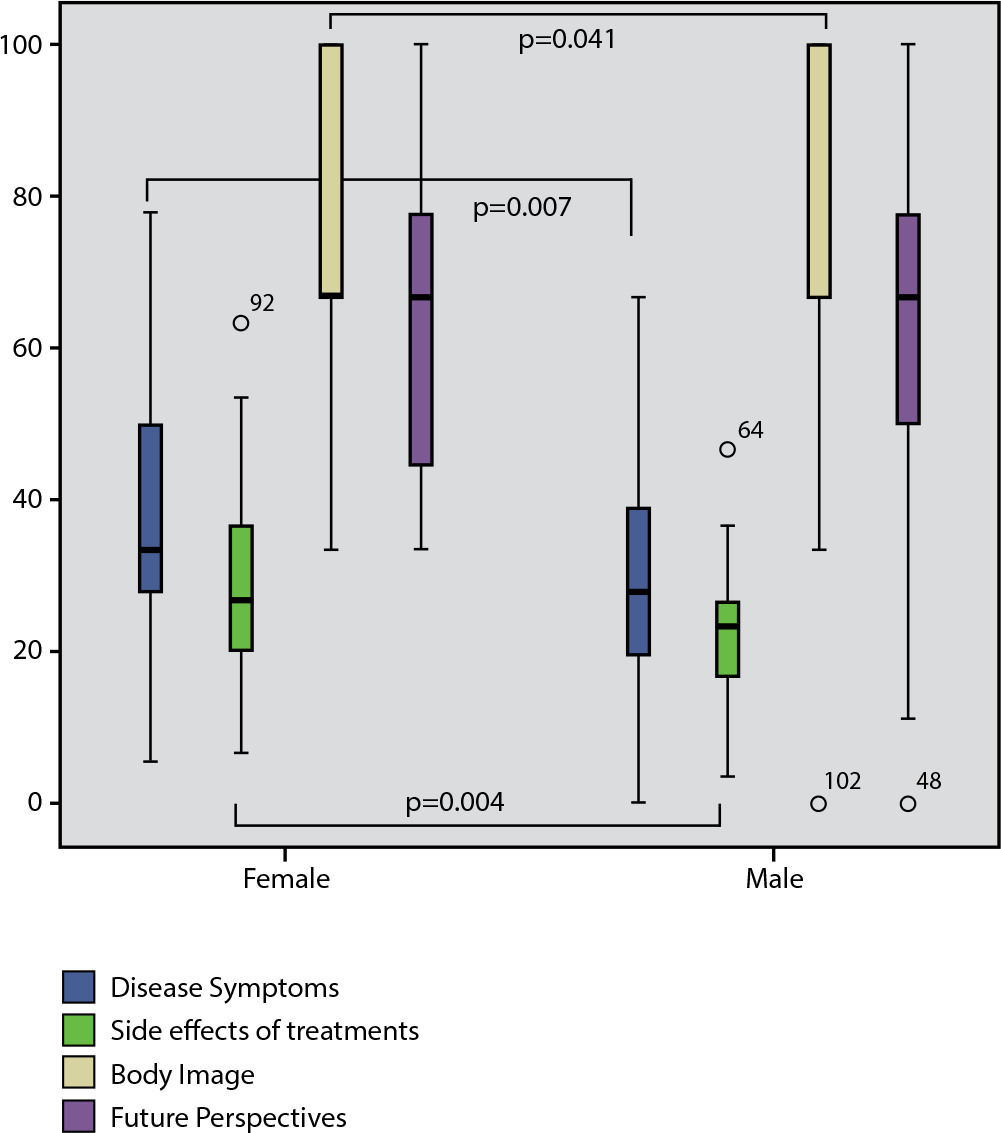
-
ORIGINAL ARTICLE05-03-2024
Pregnancy loss in women with systemic lupus erythematosus: Grounded Theory
Revista Brasileira de Enfermagem. 2024;77(1):e20230225
Abstract
ORIGINAL ARTICLEPregnancy loss in women with systemic lupus erythematosus: Grounded Theory
Revista Brasileira de Enfermagem. 2024;77(1):e20230225
DOI 10.1590/0034-7167-2023-0225
Views0See moreABSTRACT
Objective:
to learn the meanings attributed to pregnancy loss by women with Lupus.
Method:
qualitative research, based on Symbolic Interactionism and Grounded Theory. Data collection took place between January and August 2022 through in-depth interviews. Data analysis went through the stages of initial and focused coding.
Results:
seventeen women participated. The central phenomenon “The climb to motherhood: falls and overcoming” was constructed, consisting of three categories: “Falling to the ground during the climb: the experience of pregnancy loss”; “Getting up and following the path: new attempts to conceive”; and “Remembering the journey: meanings attributed to pregnancy losses”.
Final considerations:
experiencing pregnancy is, analogously, like climbing a mountain, where obstacles need to be overcome to reach the summit. The experience of pregnancy loss is seen as complex, especially when there is fragility in healthcare and a lack of awareness regarding feelings of loss and grief.
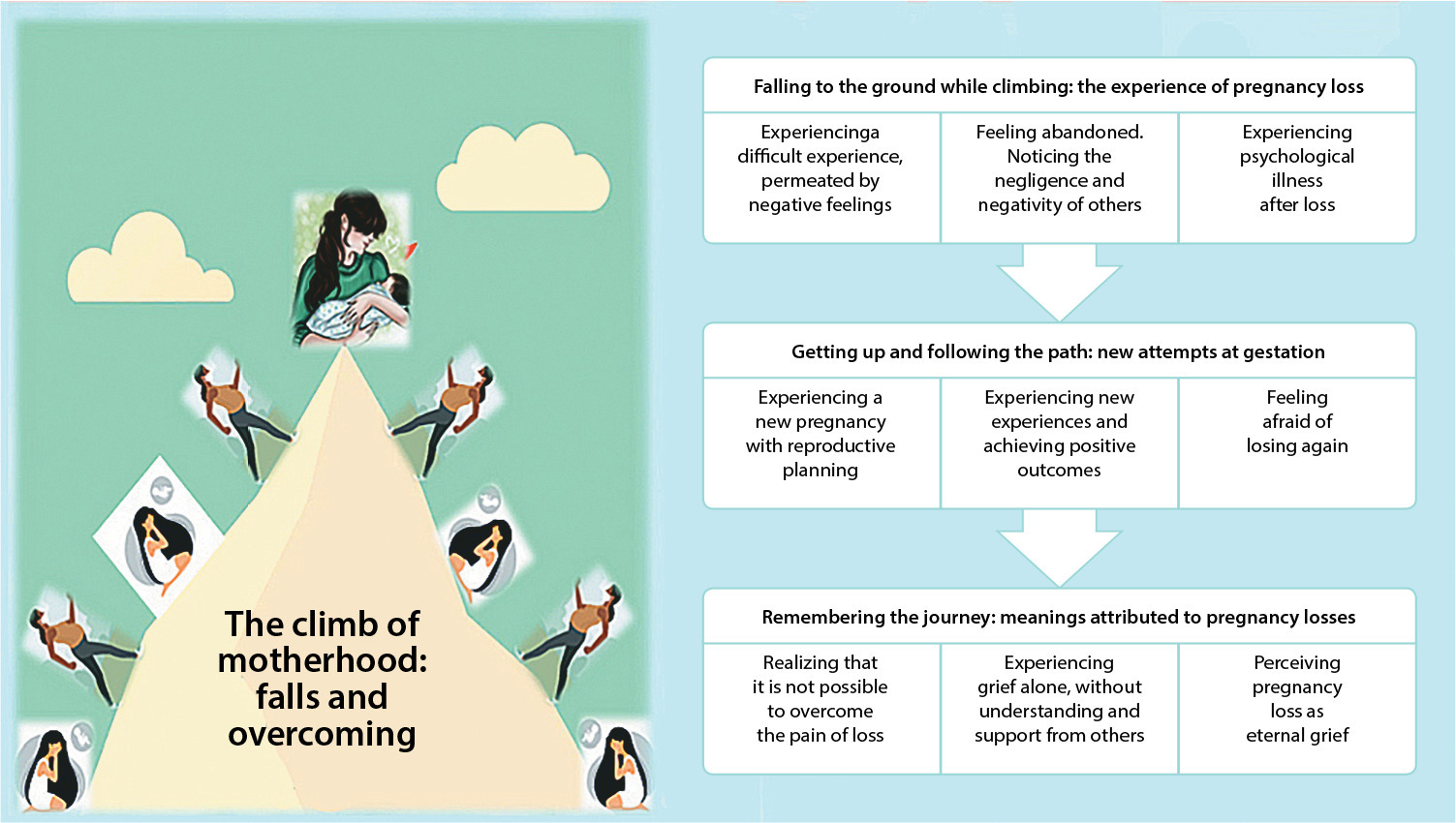
-
05-03-2024
Preditores de volume excessivo de líquidos em pacientes em hemodiálise: estudo observacional
Revista Brasileira de Enfermagem. 2024;77(1):e20220816
Abstract
Preditores de volume excessivo de líquidos em pacientes em hemodiálise: estudo observacional
Revista Brasileira de Enfermagem. 2024;77(1):e20220816
DOI 10.1590/0034-7167-2022-0816
Views0See moreRESUMEN
Objetivos:
evaluar los factores de riesgo del exceso de volumen de líquido en pacientes en hemodiálisis.
Métodos:
estudio retrospectivo de casos y controles. Se incluyeron 392 pacientes (196 casos y 196 controles) de dos centros de hemodiálisis. Se evaluaron datos sociodemográficos y 23 factores de riesgo de exceso de volumen de líquido mediante un formulario de recolección de datos. Los datos se analizaron mediante un modelo de regresión logística multivariado.
Resultados:
factores de riesgo conocimiento insuficiente (OR=2,06), ingesta excesiva de líquidos (OR=2,33), retirada inadecuada de líquidos durante la hemodiálisis (OR=2,62) e ingesta excesiva de sodio (OR=1,91) pueden aumentar aproximadamente dos veces la posibilidad de que se produzca un exceso de volumen de líquido en pacientes en hemodiálisis. La educación (OR=0,95) y la edad (OR=0,97) son factores protectores del volumen excesivo de líquido.
Conclusiones:
conocer estos factores de riesgo puede ayudar a las enfermeras a realizar una inferencia diagnóstica precisa y rápida del riesgo de volumen excesivo de líquidos.
-
REVIEW05-03-2024
Nursing interventions to empower the family caregiver of person with lower limb amputation: scoping review
Revista Brasileira de Enfermagem. 2024;77(1):e20230264
Abstract
REVIEWNursing interventions to empower the family caregiver of person with lower limb amputation: scoping review
Revista Brasileira de Enfermagem. 2024;77(1):e20230264
DOI 10.1590/0034-7167-2023-0264
Views0See moreABSTRACT
Objectives:
to map nursing interventions that empower the Family caregiver of the person with lower limb amputation for is role.
Methods:
scoping review guided by Joanna Briggs Institute methodology conducted in different databases (including gray literature).
Results:
six studies published between 2009 and 2021 were included. Interventions of counselling and support for patients and family; peer support interventions performed by a certified pair; involvement of caregivers or family members in support groups; and key interventions for patient and family caregiver psychological balance. Two studies discussed the importance of caregiver and amputee training and development of coping skills. Another study recommended Interventions of informative support for caregivers regarding care for the amputee and adaptation to home.
Conclusions:
results of this review allow the identification of recommendations (guidelines) for practice and recommendations/suggestions for interventions according with identified needs of family caregivers of patients with lower limb amputation.
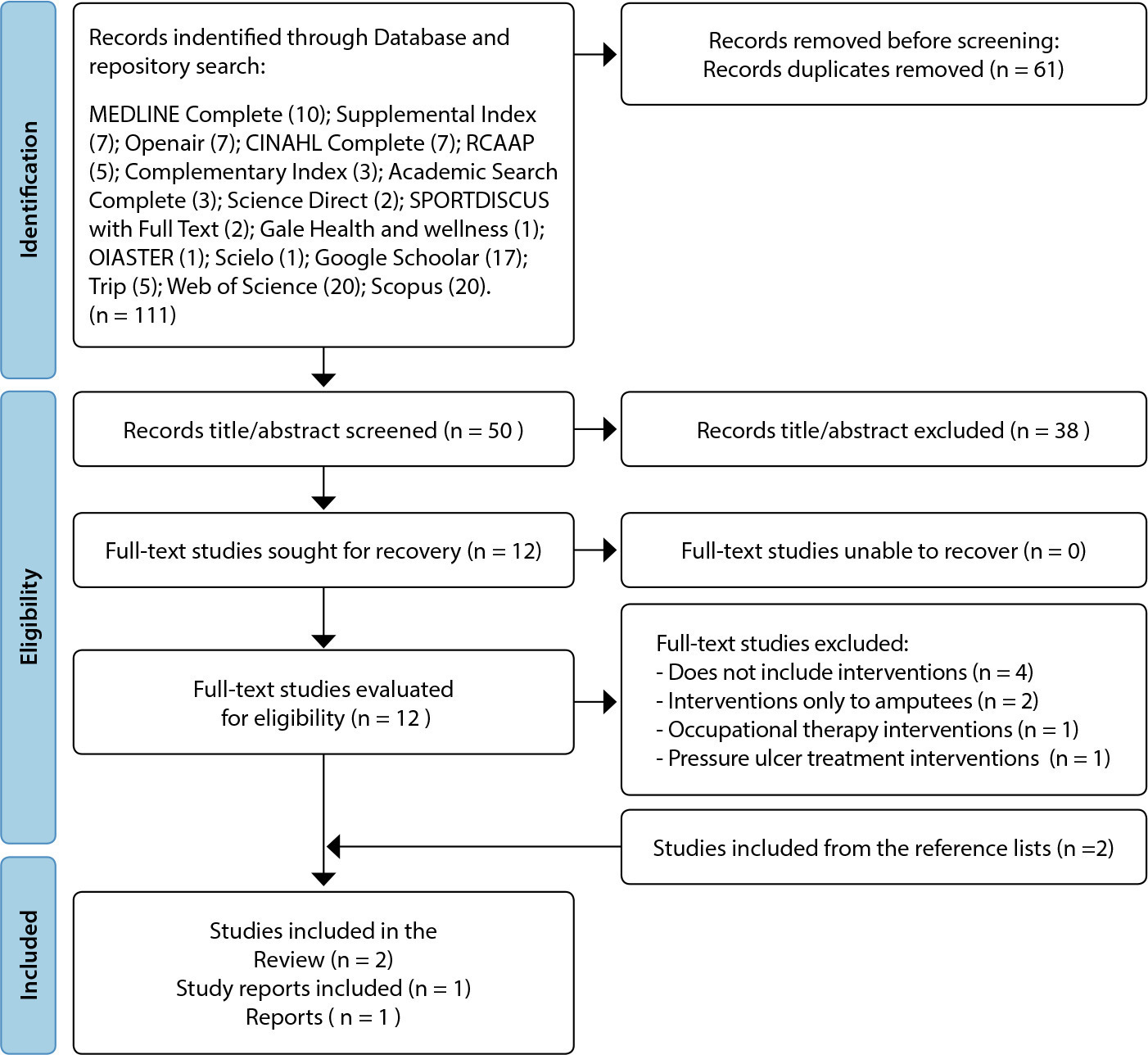
-
05-03-2024
Intervenções de Enfermagem para capacitar o cuidador familiar de uma pessoa com amputação de membro inferior: revisão de escopo
Revista Brasileira de Enfermagem. 2024;77(1):e20230264
Abstract
Intervenções de Enfermagem para capacitar o cuidador familiar de uma pessoa com amputação de membro inferior: revisão de escopo
Revista Brasileira de Enfermagem. 2024;77(1):e20230264
DOI 10.1590/0034-7167-2023-0264
Views0See moreRESUMEN
Objetivos:
mapear intervenciones de enfermería que capaciten al cuidador familiar de la persona con amputación de miembro inferior para su rol.
Métodos:
es una revisión de alcance guiada por la metodología del Instituto Joanna Briggs, llevada a cabo en diferentes bases de datos (incluyendo literatura gris).
Resultados:
se tuvieron en cuenta seis estudios publicados entre 2009 y 2021, a saber: intervenciones de asesoramiento y apoyo para pacientes y familiares; intervenciones de apoyo entre iguales realizadas por un par de profesionales certificados; participación de cuidadores o familiares en grupos de apoyo e intervenciones clave para el equilibrio psicológico del paciente y del cuidador familiar. Dos estudios analizaron la importancia de la formación del cuidador y del amputado y del desarrollo de habilidades de afrontamiento. Otro estudio recomendó intervenciones de apoyo informativo para los cuidadores en relación con el cuidado del amputado y su adaptación a la vida hogareña.
Conclusiones:
los resultados de esta revisión permiten identificar recomendaciones/directrices para la práctica y recomendaciones/sugerencias de intervenciones según las necesidades identificadas de los cuidadores familiares de pacientes con amputación de miembros inferiores.
-
05-03-2024
Propiedades psicométricas de la versión chilena del cuestionario de calidad de vida para mieloma múltiple
Revista Brasileira de Enfermagem. 2024;77(1):e20230100
Abstract
Propiedades psicométricas de la versión chilena del cuestionario de calidad de vida para mieloma múltiple
Revista Brasileira de Enfermagem. 2024;77(1):e20230100
DOI 10.1590/0034-7167-2023-0100es
Views0See moreRESUMEN
Objetivos:
Evaluar consistencia interna y validez de constructo del QLQ-MY20 para valoración de calidad de vida en sobrevivientes de mieloma múltiple en Chile.
Métodos:
Estudio transversal, realizado entre marzo 2020 y diciembre 2022. Participaron 118 personas de dos hospitales públicos. Se utilizaron los cuestionarios QLQ-C30 y QLQ-MY20. Fueron evaluadas la consistencia interna con alfa de Cronbach (α) y validez de constructo mediante pruebas de hipótesis (Mann Whitney y correlación de Spearman).
Resultados:
El promedio de edad de los participantes era 67,2 (DE=9,2) años. Consistencia interna para escala completa (α=0,779), dimensión “síntomas de la enfermedad” (α=0,671), dimensión “efectos secundarios de los tratamientos” (α=0,538) y dimensión “perspectiva de futuro” (α=0,670). Se comprobaron cuatro de las cinco hipótesis de la validez de constructo: presentaron más síntomas las mujeres, personas con peor performance estatus, con dolor y con peor fatiga.
Conclusiones:
La versión chilena del QLQ-MY20 presenta adecuada consistencia interna y validez de constructo.
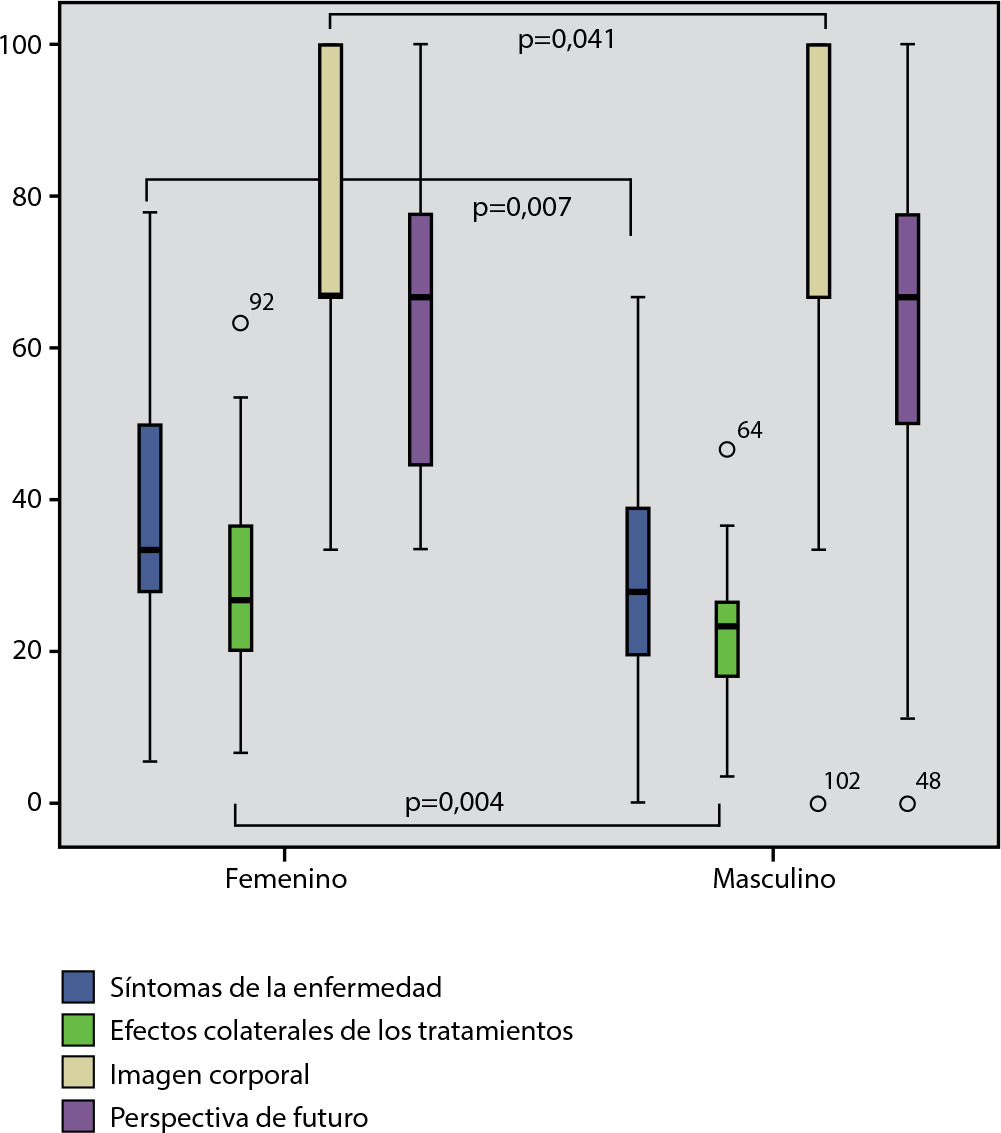
-
ORIGINAL ARTICLE08-30-2021
Mental health in adolescence: Elaboration and validation of an educational technology for health promotion
Revista Brasileira de Enfermagem. 2021;74(5):e20201023
Abstract
ORIGINAL ARTICLEMental health in adolescence: Elaboration and validation of an educational technology for health promotion
Revista Brasileira de Enfermagem. 2021;74(5):e20201023
DOI 10.1590/0034-7167-2020-1023
Views1See moreABSTRACT
Objective:
to build and validate the appearance of a digital educational technology to promote the mental health of school adolescents.
Methods:
methodological study, which included the elaboration and validation of the “Conect@dos com a S@ude” online course based on the Galvis-Panqueva methodological framework. The elaboration was based on a literature review and followed the Theory of Meaningful Learning. The validation was performed by a total of 21 adolescent students, using an instrument adapted for the study. A quantitative analysis was performed from the Content Validity Index and descriptive of the suggestions pointed out by the target audience.
Results:
the analysis of the Content Validity index ranged from 0.8 to 1 in all evaluated items. The adolescents presented some suggestions for improvement for the course, most of them were accepted.
Conclusion:
the course was validated by the target audience.

-
REVIEW08-16-2021
Fatigue due to compassion in health professionals and coping strategies: a scoping review
Revista Brasileira de Enfermagem. 2021;74(5):e20190628
Abstract
REVIEWFatigue due to compassion in health professionals and coping strategies: a scoping review
Revista Brasileira de Enfermagem. 2021;74(5):e20190628
DOI 10.1590/0034-7167-2019-0628
Views0See moreABSTRACT
Objectives:
to identify the current state of knowledge on compassion fatigue in the work context of healthcare professionals; and how coping strategies are established in this scenario.
Method:
a scoping review with search applied to the databases: MEDLINE, LILACS, CINAHL, Scopus. Temporal limit: 2009 to 2019. The data was analyzed and synthesized in narrative form
Results:
thirty articles were selected, synthesized into two categories: a) Health work and compassion fatigue: conceptual analysis, context, and manifestations; b) Coping strategies for compassion fatigue.
Conclusions:
this study presented: a descriptive and general panorama about compassion fatigue in healthcare professionals, identifying a greater consolidation of the concept between 2015 and 2018; and some coping strategies. The association between health and spirituality is highlighted as one of the strategies in this scenario, enabling new research to be conducted in view of the importance of the theme in life, health work.

-
EXPERIENCE REPORT06-11-2021
Care management in coping with COVID-19 at a teaching hospital
Revista Brasileira de Enfermagem. 2021;74:e20200970
Abstract
EXPERIENCE REPORTCare management in coping with COVID-19 at a teaching hospital
Revista Brasileira de Enfermagem. 2021;74:e20200970
DOI 10.1590/0034-7167-2020-0970
Views0See moreABSTRACT
Objective:
to report the experience of implementing care management strategies in coping with the COVID-19 pandemic in a teaching hospital.
Method:
this is an experience report of the managers who work at the largest public hospital in Paraná with functions as Head of the Care Management Division, Head of the Care Lines Management Sector, Head of the Infectiology Unit and support team.
Results:
care management strategies were structured based on the service dynamics; physical structure; human Resources; professional and user safety.
Final considerations:
preparing for a pandemic involves measures that include modifying infrastructure and processes, managing employees and users, infection prevention strategies, and clinical recommendations. These measures are necessary to optimize the quality of care provided to users with COVID-19 and to reduce the risk of viral transmission to other users or health professionals.
-
ORIGINAL ARTICLE10-26-2020
Suspected COVID-19 flu-like syndrome in men who have sex with men and have been involved in casual sex
Revista Brasileira de Enfermagem. 2020;73:e20200913
Abstract
ORIGINAL ARTICLESuspected COVID-19 flu-like syndrome in men who have sex with men and have been involved in casual sex
Revista Brasileira de Enfermagem. 2020;73:e20200913
DOI 10.1590/0034-7167-2020-0913
Views0See moreABSTRACT
Objective:
To evaluate the presence of flu-like syndrome suggestive of COVID-19 in men who have sex with men (MSM) and engaged in casual sex during a period of social isolation.
Method:
National epidemiological survey, applied in April and May 2020, by adaptation of Respondent Drive Sampling.
Results:
1,337 MSM participated in the survey, of which 514 (38.4%) had fever associated with another sign or symptom of flu-like syndrome. Social, demographic characteristics, sexual practices and activities during the period of social isolation were statistically associated with the presence of flu-like syndrome. There was a statistical difference (p < 0.001) in the average of partners between those who had signs and symptoms of flu-like syndrome (3.5) and those who did not (1.7).
Conclusion:
Evidence of signs and symptoms indicative of flu-like syndrome suggestive of COVID 19 in Brazilian MSM who were involved in casual sex during the period of social isolation.

-
ORIGINAL ARTICLE08-10-2020
Palliative care consultation team: symptom relief in first 48 hours of hospitalization
Revista Brasileira de Enfermagem. 2020;73(6):e20190391
Abstract
ORIGINAL ARTICLEPalliative care consultation team: symptom relief in first 48 hours of hospitalization
Revista Brasileira de Enfermagem. 2020;73(6):e20190391
DOI 10.1590/0034-7167-2019-0391
Views0See moreABSTRACT
Objective:
To compare the relief of symptoms provided by palliative care consultation team (PCCT) compared to the traditional care team (TC), in patients with advanced cancer in the first 48 hours of hospitalization.
Method:
Allocated to PCCT Group and TC Group, this study assessed 290 patients according to the Edmonton Symptom Assessment System (ESAS) within the first 48 hours of hospitalization. The main outcome was a minimum 2-point reduction in symptom intensity.
Results:
At 48 hours, the PCCT Group had a 2-point reduction in the mean differences (p <0.001) in pain, nausea, dyspnea, and depression; and TC Group, on nausea and sleep impairment (p <0.001). Multiple Logistic Regression found for the PCCT Group a greater chance of pain relief (OR 2.34; CI 1.01-5.43; p = 0.049).
Conclusion:
There was superiority of the PCCT Group for pain relief, dyspnea and depression. There is a need for more studies that broaden the understanding of team modalities.
-
REVIEW10-05-2020
Self-efficacy of health professionals in hand hygiene practice: is it possible to measure?
Revista Brasileira de Enfermagem. 2020;73:e20190873
Abstract
REVIEWSelf-efficacy of health professionals in hand hygiene practice: is it possible to measure?
Revista Brasileira de Enfermagem. 2020;73:e20190873
DOI 10.1590/0034-7167-2019-0873
Views0See moreABSTRACT
Objective:
To identify in the literature the tools used to measure self-efficacy of health professionals in hand hygiene.
Methods:
Integrative literature review carried out by consulting the databases PubMed, Scopus, Web of Science, Cumulative Index to Nursing and Allied Health Literature, Europe PubMed Central, and Science Direct using the descriptors Self Efficacy, Hand Hygiene, and Health Personnel.
Results:
Six articles, all of which with observational design, were selected. It was possible to infer that four studies used validated instruments to measure self-efficacy of health professionals in the conformity with the recommendations for hand hygiene. The other studies used questionnaires that were not validated.
Final considerations:
Despite the extensive literature on hand hygiene, there is a lack of scientific evidence regarding the use of validated instruments to measure self-efficacy of health professionals in the procedure. The use of properly validated psychometric instruments is useful to guarantee the quality of results in studies.

-
REVIEW07-09-2021
Breast cancer screening in Primary Health Care in Brazil: a systematic review
Revista Brasileira de Enfermagem. 2021;74(3):e20200995
Abstract
REVIEWBreast cancer screening in Primary Health Care in Brazil: a systematic review
Revista Brasileira de Enfermagem. 2021;74(3):e20200995
DOI 10.1590/0034-7167-2020-0995
Views1See moreABSTRACT
Objectives:
to analyze care strategies for breast cancer screening in Primary Health Care in Brazil.
Methods:
this is a systematic review following the Cochrane Collaboration recommendations.
Results:
among 355 manuscripts, five were eligible. The patient navigation program by Community Health Agent stood out with the best result, among the strategies: flexibility of goals considering viability; community engagement; team training; active search of the target population by Community Health Agent; request for mammography by physicians; actions integrated to women’s health; monitoring of mammography results, absent users, and population coverage by physician and nurse; and assessment of criteria for requesting screening mammography by means of an information system. The population coverage rate in the program ranged from 23% to 88%.
Conclusions:
Primary Health Care in Brazil presents devices with potential to induce the production of care for breast cancer screening.

-
REFLECTION02-15-2021
The belief in health in the adoption of COVID-19 prevention and control measures
Revista Brasileira de Enfermagem. 2021;74:e20200576
Abstract
REFLECTIONThe belief in health in the adoption of COVID-19 prevention and control measures
Revista Brasileira de Enfermagem. 2021;74:e20200576
DOI 10.1590/0034-7167-2020-0576
Views0See moreABSTRACT
Objective:
Reflect, in the light of the Health Belief Model, on the adoption of behavioral measures in the context of COVID-19.
Methods:
Theoretical-reflective essay, based on the Health Belief Model, to reflect on adherence to preventive behaviors in the pandemic of COVID-19.
Results:
Adherence to preventive behaviors is strongly influenced by socioeconomic, territorial, political and individual factors in the face of critical health situations. In addition, the spread of false news modulates the thinking and execution of behavioral actions in the population.
Final Considerations:
It is necessary to understand the importance of health communication processes and the use of tools aimed at responsible human behavior and engaged in the adoption of a preventive posture.
Search
Search in:
Nuvem de Tags
Adolescente (85) Atenção Primária à Saúde (239) COVID-19 (91) Criança (91) Cuidados de Enfermagem (269) Educação em Enfermagem (151) Educação em Saúde (139) Enfermagem (930) Enfermagem Pediátrica (86) Estudantes de Enfermagem (77) Estudos de Validação (131) Família (87) Idoso (208) Promoção da Saúde (99) Qualidade de Vida (104) Saúde do Trabalhador (86) Saúde Mental (145) Saúde Pública (82) Segurança do Paciente (150) Tecnologia Educacional (100)



